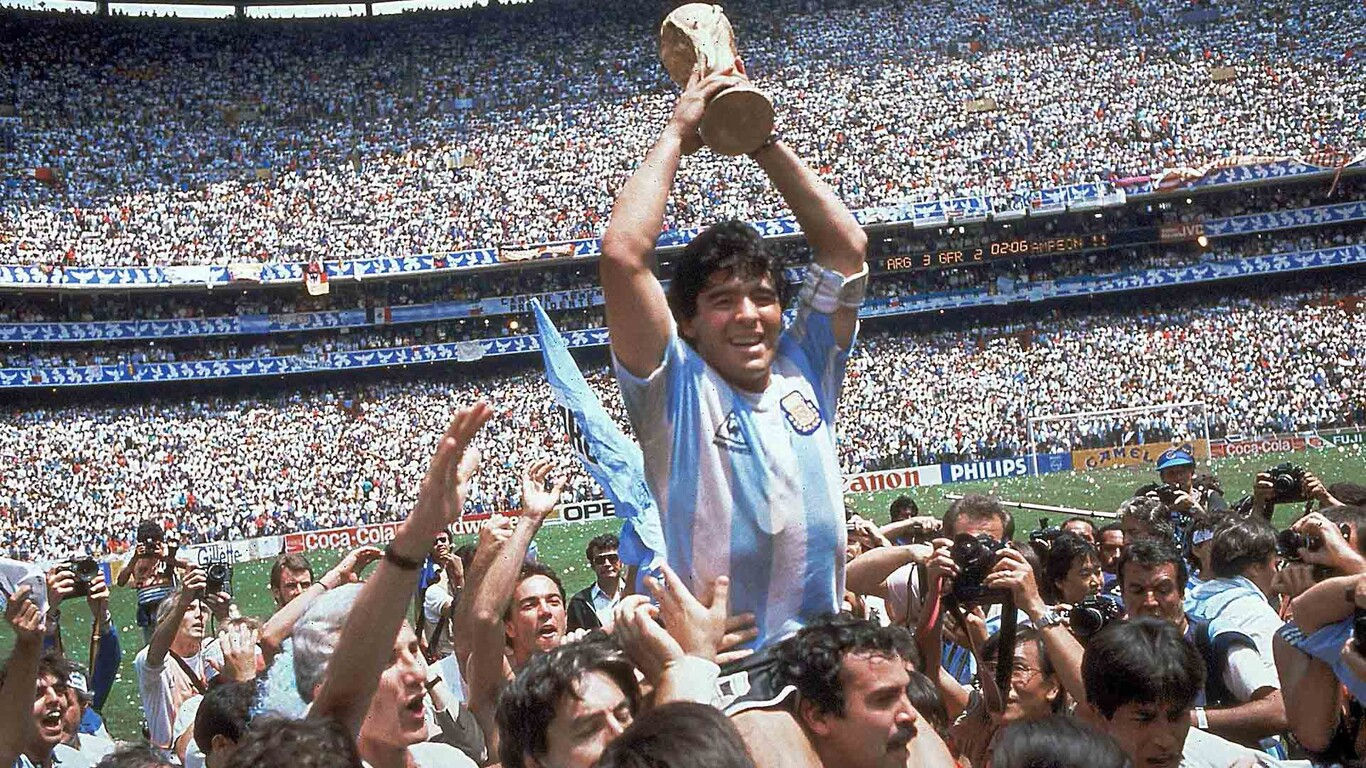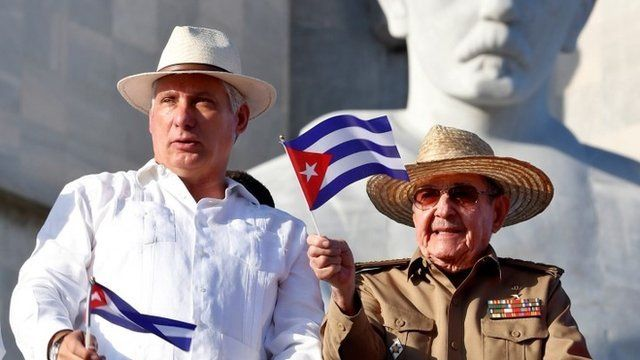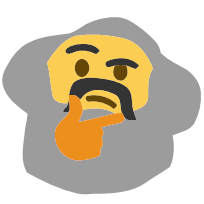(Buenos Aires, 1960 - Dique Luján, 2020) Argentine soccer player, one of the greatest in history, often compared to the legendary Pelé. Although his skill with the ball and his refined technique matched that of the Brazilian, Maradona's career was much more irregular: his difficult character, health problems and drug addiction marred part of his career, but did not prevent his genius from shining on numerous occasions. After winning the 1979 World Youth Championship with his country's national team and triumphing two years later with Boca Juniors, he began a European tour that took him to F.C. Barcelona (1982-84), Napoli (1984-91) and Sevilla (1992-93). Back in Argentina, he played for Newell's Old Boys and Boca Juniors before retiring in 1997. With the Argentine national team he participated in four World Cups and won the World Cup title in Mexico (1986), in which he had a wonderful and unforgettable performance.
Argentina's most popular soccer player was born, according to the Civil Registry, on October 30, 1960 in Lanús, although everyone identifies him as El Pelusa from Villa Fiorito, where he spent his childhood and from where he rose to fame. At the age of nine he began his love affair with soccer, when he played in a children's team known as Los Cebollitas. Don Diego, his father, ran a small soccer field in the neighborhood and managed the Estrella Roja team, which Diego Jr. joined as a teenager and in spite of his older teammates. He studied at the Avellaneda commercial school, but did not finish the first year of high school, because he spent his time playing little games (almost juggling) with the ball.
Signed by Argentinos Juniors, he made his debut in the first division in 1976, ten days before his sixteenth birthday. He continued playing for Argentinos Juniors until 1980, and although his team did not win any championship, Maradona was the top scorer in the Argentine tournaments of 1978, 1979 and 1980. In 1979 he was part of the youth team that won the world championship. In 1981 he moved to Boca Juniors (River Plate also tried to sign him), team with which he became champion that same year.
European adventure
By then, the clubs of the old continent were already the natural destination for the great promises of American soccer, and Maradona was the most outstanding. Signed in 1982 by Futbol Club Barcelona for 1,200 million pesetas (7.2 million euros, an astronomical figure at the time), he won the League Cup, the King's Cup (both in 1983) and the Spanish Super Cup (1984) with the Azulgranas, but hepatitis and a major injury affected his performance. Again for an astronomical fee, he moved to Napoli in 1984, with whom he won the 1987 and 1990 leagues, the 1989 UEFA Cup and the 1991 Italian Super Cup.
During his time in Italy, he married Claudia Villafañe, with whom he would have two daughters, Dalma and Giannina. Maradona remained with Napoli until 1991, when an anti-doping control detected cocaine consumption, for which he was suspended for fifteen months. Shortly after, he was arrested in Buenos Aires in a police raid. On April 28, 1992 he was released from prison and was charged with supplying and possessing drugs.
His international career ended stormily at Sevilla, a team with which he did not complete the 1992-1993 season. When he returned to Argentina after his European experience, he played for the Rosario club Newell's Old Boys (1993-1994) and, after serving the suspension imposed in 1994 by the international soccer authority (FIFA), he returned to the Boca Juniors jersey in 1995, in an irregular season in terms of his performance. In October 1997 he announced his definitive retirement after, once again, testing positive in an anti-doping test.
The hand of God and the goal of the century
With the Argentine national team, Maradona had already shown his magic in the team that won the World Youth Championship in Japan (1979). At senior level, Maradona was part of the national teams that took part in four world championships: Spain (1982), Mexico (1986), Italy (1990) and the United States (1994). He won the world championship in Mexico (1986) and was runner-up in Italy (1990). In the 1994 World Cup in the United States, he only played two matches; after the second, he tested positive in an anti-doping control and was suspended.
Where he shone most brightly was undoubtedly in the World Cup in Mexico, when his ability to drag the entire defense of the opposing team with his impressive dribbling and projection left the millions of fans watching the championship on television stunned. Particularly memorable was his performance in the quarterfinals: four years after the Falklands War, England and Argentina were facing each other in a match of maximum rivalry, which ended with a 2-1 victory for the Albicelestes, with two goals by Maradona.
The first of them should have been disallowed (Maradona fisted a ball that was in dispute with the British goalkeeper), but it is no less famous for that: when asked afterwards if he had scored the goal with his hand, Maradona replied that it had been “the hand of God”, and with that name he went down in history. The second goal, rightly called the goal of the century, was one of his geniuses that is hard to beat: starting from his own half, Maradona dribbled past five English players and the goalkeeper, one after the other, and scored with a left-footed shot.
Professionally, after his retirement he worked as a coach, manager of Boca Juniors, sports commentator and television presenter. Despite the numerous scandals and controversies he was involved in during and after his sporting career, Maradona continued to be idolized in his country. El Pelusa knew how to thrill soccer lovers and earned a place in the history of the sport. The song composed by Fito Páez (Dale alegría a mi corazón) and the tango Mago Diego, by Enrique Bugatti, are some of the tributes that his compatriots dedicated to him.
In 2008 he was appointed coach of the Argentine national soccer team, and his tenure, as was to be expected, was controversial: despite having the likes of Leo Messi, whom he recognized as his successor, the Albiceleste team did not make it past the quarterfinals of the 2010 World Cup in South Africa. His unsuccessful coaching career continued in the United Arab Emirates, Belarus, Mexico and finally in his native Argentina; he was coach of Gimnasia La Plata when, at the age of 60, he died due to a sudden worsening of his delicate health.
Megathreads and spaces to hang out:
- 📀 Come listen to music and Watch movies with your fellow Hexbears nerd, in Cy.tube
- 🔥 Read and talk about a current topics in the News Megathread
- ⚔ Come talk in the New Weekly PoC thread
- ✨ Talk with fellow Trans comrades in the New Weekly Trans thread
- 👊 Share your gains and goals with your comrades in the New Weekly Improvement thread
- 🧡 Disabled comm megathread
reminders:
- 💚 You nerds can join specific comms to see posts about all sorts of topics
- 💙 Hexbear’s algorithm prioritizes comments over upbears
- 💜 Sorting by new you nerd
- 🌈 If you ever want to make your own megathread, you can reserve a spot here nerd
- 🐶 Join the unofficial Hexbear-adjacent Mastodon instance toots.matapacos.dog
Links To Resources (Aid and Theory):
Aid:
Theory:



removed startrek.website from our allow-list as they decided to defederate:
https://startrek.website/post/15928569
"We cant have tankies spreading communist propaganda on our fans site for the most blatant depiction of FALGSC ever to come to screen!"
-Deeply unserious Trekies
I loathe them. I'm a classic trekkie. I'm too young to have seen TOS on first run, but I did see TNG on first run and saw many TOS episodes at the same time. They were very formative. I am fucking proud of this defederation decision. Self-described trekkies who rail against socialist ideas have missed the whole fucking point, fuck them.
People on this site who have never seen an episode of Trek in their lives are better trekkies than them. All my comrades here are honourary trekkies as far as I'm concerned because while you all might not know the minutia of the series, you all have the heart and soul of it at its best.
To summarize:
Couldn't have said it better. Star Trek is OUR vision of the future. They get B5 at best, probably Alien realistically if they even get thst far
What no Historical Materialism does to people. They think they can slice up Marxism and somehow Communism will magically come into existence without needing to be built first.
These are the very "utopian" socialists that Marx railed against.
Yep, without revolutionary theory there can be no revolutionary practice.
They claim to love the Federation but they decided to defederate
Marx considered to be failures liberal trekkies.
A shame they failed to learn the lessons from the show.
The worst ones are the ones who think great episodes like "Duet" or "Bar Association" or "The City on the Edge of Forever" or "Family" or "The Drumhead" or "The Pegasus" are boring because there's no big fancy starship battles.
Also, whenever someone says that "In the Pale Moonlight" is the best DS9 episode but also never talks about "Progress" or "Duet", I know they're completely full of shit. It's a good episode but not nearly the best one. At least the Voyager (aka TOS 2.0) fans appreciate kitsch and are generally fun people. The DS9 fans who came in around season 4 or so and think the first few seasons are dumb and boring are the kind of fake trekkies I loathe. They missed the point entirely.
("The Wire" is a far better Garak-centered episode in my opinion.)
Major Babylon 5 spoilers, DO NOT READ if you are planning to watch this series to the end, or if you haven't seen it IN ITS ENTIRETY.
And yes, maybe it's slightly hypocritical of me to be a huge Babylon 5 fan while decrying the Dominion War arc, but telling the story of the Shadow War was the entire purpose of the series. And even though there were frequent battle scenes, it was in service of a story warning the audience how to recognize rising fascism, why it must be stopped at all costs, how to fight it, the consequences of failing to fight it, and the promise of a better future if we could just work together in good faith. Ivanova's closing monologue in "Sleeping in Light" is extremely Trek - it just arrived at that point through a different route.We didn't get the bait-and-switch in B5 that we got with DS9. DS9 was supposed to be about the difficulties of rebuilding a world after a holocaust. It was supposed to be more introspective. It wasn't supposed to be CGI fleets of thousands of unnamed ships exploding on screen at once and millions of anonymous unnamed disposable crew dying in those battles. It was supposed to be a series of episodes like "Progress" and "Destiny" and "Shakaar" and "Duet" and "The Wire", stories about a society coming to terms with massive collective trauma, of the full gamut of experiences and emotions of the survivors, of how they would act in the aftermath of regaining their freedom from fascism.
I really like "Progress" and "Duet". We need to watch them on the hextube sometime in that order. I think they'll find a very receptive and appreciative audience even among people who have never seen an episode of DS9 in their lives. They don't even require much backstory to understand. They both have those great types of scripts that could easily be adapted to any series format, any genre, any time period - and still have the same emotional and intellectual impact.
What are they even whining about? Did someone tell them Janeway was a fascist?
Wondering what the last straw for those fucking libs was and whether it was this post where several of us dunked on a terrible pro-kamala bit.
Propaganda is when you don't follow the US State Department line on all global issues.
created by Rick Berman
the comments on that post are crazy wow
Damn wish I never clicked that link. The rest of Lemmy is scary
Star Trek: Planet of the Fash
They were one of the most consistently lib instances
This whole lemmy thing doesn't seem to be working out
I mean the software's doing the job fine, and it works for the instances that want to talk to other instances
Nobody is more quick to shut you out of conversation than the people that claim to hold and open dialogue as the most important markers of a free society.
and open dialogue as the most important markers of a free society.
Slamming the overton window shut on the fingers of dissent.
The English internet and its consequences
I'm sure the software's fine, I was talking more about the increasing rightward shift of lemmy, it seems to be turning into a dollar store version of 4chan
Who put all this fascism in my anticommunism!?
In fairness I don't think the devs should be expected to invent a Gulag-over-IP protocol all by themselves
Maybe, but this stuff is eventually gonna come to a head and those founders are gonna be forced to make a decision
The No Nazi Bar rule is real and has to be strictly adhered to, but lemmy has dropped the ball on it hard
What can the founders do, though? One of the big drawbacks of FOSS is that you literally have no say over who can use your software. If the Azov Battalion wants to run a Lemmy instance, Dessalines and Nutomic are powerless to stop them because all they have to so is clone the repo and run a server.
That's precisely the reason I don't see this ending well at all
Liberals when they're using a defederated news agregator made by commies; "Why are there so many fucking commies on this platform!?!?!?!?!"
"Why are there so many fucking commies on this platform!?!?!?!?!" 
the gif in this comment makes me so angry, you do not have to be a lip-reading expert to see that he is not saying thank you, or at least not just that.
no, Picard is saying "Hawk Tuah"
Looks like 'There you are'?
The other one that shits me up the wall is the bugs bunny 'no' one with the wrong tongue placement
spoiler